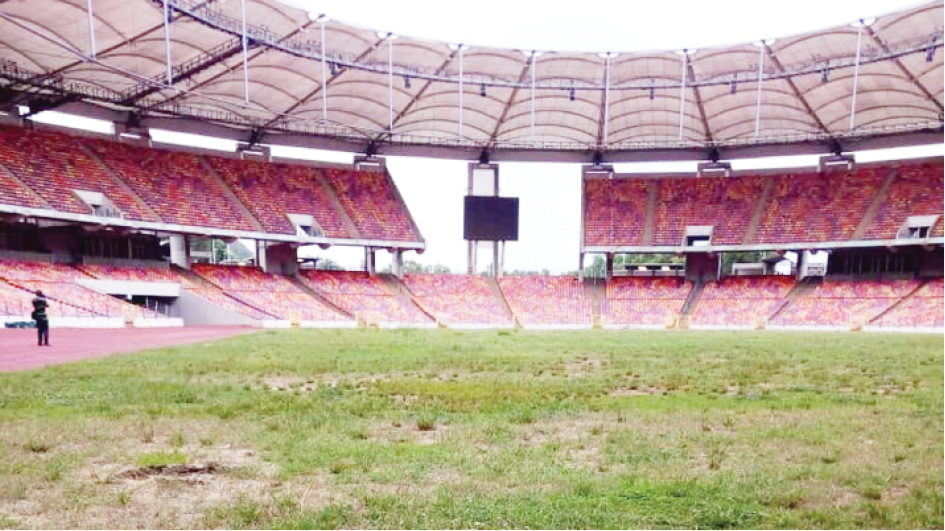On October 4, 2003, former President Olusegun Obasanjo officially commissioned a new 60,000 capacity national stadium for the 8th edition of the All Africa Games tagged ‘Abuja 2003’.
Prior to the opening ceremony, Obasanjo described the stadium as a symbol of peace and unity through sports in Nigeria, Africa and the whole world just as he emphasized the need to maintain the stadium as a national monument that was built with a whopping $360 million.
The stadium as it stands today remains the biggest in Nigeria and was rated among the 50 most expensive stadiums in the world when it was commissioned.
When the magnificent stadium was built, it was designed and engineered in compliance with the requirements of international sport associations, particularly the Fédération Internationale de Football Association (FIFA) and the International Association of Athletics Federations (IAAF).
The Abuja National Stadium which has been renamed MKO Abiola National Stadium consists of a 60,491-capacity covered main bowl, a presidential suite and viewing area, 56 corporate suites, modern turnstiles, a box office, post offices, banks and media facilities.
It also met international safety standards as there are emergency service units, closed circuit security cameras, crowd control steel fencing as well as stand-by fire-fighting equipment and metal detectors which unfortunately have either been destroyed or stolen.
Other facilities are two scoreboards and floodlights, shops and kiosks for snacks, a stand-by power supply system, a Helipad, a 3000 capacity indoor sports hall, a 2000 capacity gymnasium, a 2000 capacity swimming pool, a 4000 vehicle parking lot, an artificial lake, tennis courts, a 3000 capacity hockey stadium, a 400 capacity VIP car park, baseball, softball complex and a velodrome which was once destroyed by thunderstorm two hours before the closing ceremony of the 8th All Africa Games.
However, 17 years after, the once breathtaking architectural masterpiece is now a shadow of its old self as most of the facilities at the package A and B of the MKO Abiola national stadium are allowed to waste away even as there is a yearly budget for the maintenance of the same facilities.
Shortly after the All Africa Games won by Nigeria, former Director General of the National Sports Commission, Amos Adamu advised the government to privatize the Abuja stadium immediately in order to forestall any vandalisation and looting typical of publicly owned buildings but his advice fell on deaf ears.
Sadly, due to its neglect, herdsmen at a point turned the multi billion naira stadium into a grazing area for their cows with the Olympic Velodrome used then as a warehouse while Olympic swimming pools were solely used by tadpoles. Hotel within the complex was, in turn, a shelter for the homeless.
The Package A which houses the main bowl and the training pitches
This is the football pitch where 60,491 fans can gather and watch football games but in recent years, that has not been so as the stadium was abandoned and the once lush green grass became withered.
Instead of hosting football matches, the main bowl has in the past also hosted many cultural and religious events, as well as the tragic recruitment into the Nigeria Immigration Service in 2014 where at least 19 people were killed and dozens injured.
However, the sad story of the main bowl is changing as Africa’s richest man, Aliko Dangote has given $1 million for the renovation of some parts of the 60,000 capacity stadium, which had morphed from a monument of national pride to a site of national embarrassment. The scoreboard in the stadium is to be completely changed to be Video Assistant Referee, VAR, complaint.
According to the construction company, Messrs Aron Nigeria limited, the reconstruction is expected to be completed by February 2021.
Meanwhile, the various training pitches cannot be described as world standard as the grass can reach one’s ankles and the surfaces are too bumpy for a free flow of football.
In package A, the velodrome is clearly the most underutilised facility. It was completely abandoned for close to 15 years. Instead of track cycling, it was used for different purposes ranging from private events such as weddings to corporate events such as trade fairs or job recruitment exercises.
In 2008, the velodrome hosted the MTV Africa Music Awards (MAMAs) before it was turned into a storage facility for electioneering purposes in 2015.
In 2019 however, three sporting events were held in the velodrome – the Nigeria International Taekwondo Open; All African Track Cycling Championship and the ICC Cricket World Cup Trophy Tour Driven by Nissan.
In 2020, the velodrome was used as the venue to host the 60 sports icons recently honoured by the federal government on October 16 in commemoration of the country’s 60th Independence Day.
The velodrome may be said to be somehow busy but not for the purpose it was constructed. Track cycling hardly takes place at the venue.
Package B
Package B of the Abuja national stadium houses other sporting facilities like the indoor sports halls, lawn tennis courts, handball courts, hockey stadium, Olympic size swimming pool and outdoor basketball and volleyball courts.
The same package B which also houses most of the sports federations is the worst hit by the poor maintenance culture which is responsible for the sorry state of the national stadium.
Although the Lawn tennis courts inside the package B have always been busy with tournaments, the same cannot be said of others like the hockey stadium which has become completely desolate. Tournaments are hardly staged at the once glamorous arena.
Also located inside package B, the swimming pool is not better off as apart from the 8th All Africa Games swimming events, it cannot boast of hosting many major international events.
In the past, lovers of swimming and other residents of Abuja kept the pools busy periodically by going to swim there but things have gone from bad to worse as the facility is presently locked.
However, our correspondent who was able to see part of the swimming pool noticed that the once sparkling water in the pool has become greenish and could be a ‘den’ for tadpoles and frogs to breed in.
While the Indoor sports halls and lawn tennis courts are the only active centres in package B, it is in the same part of the stadium that fire fighting vehicles are abandoned. It is an open secret that since they were brought in during the 8th All Africa Games, almost all the vehicles and fire fighting equipment have not served any good use.
Without doubt, Package A which also houses the Sports Minister’s office where he works mostly on Thursdays and Fridays is cleaner than package B which is oftentimes overtaken by weeds.
Not long ago, the minister of sports disclosed at a public function that a government agency had given his ministry a bill of N81m to clear the bush at the national stadium but it was promptly turned down due to lack of funds.
However, since the stadium was built and delivered by Julius Berger and China Civil Engineering Construction Corporation, CCECC in 2003, no year passes without the sports ministry including the maintenance of the sporting edifice in its budget.
In the 2020 budget, the sports ministry allotted the sum of N170 million for maintenance of the stadium and the amount has since risen to N250m in the current budget of the ministry.
It is, however, a thing of concern to many that the yearly budget for the maintenance of the stadium does not exclude the underutilised facilities which are presently in a poor state.

 Join Daily Trust WhatsApp Community For Quick Access To News and Happenings Around You.
Join Daily Trust WhatsApp Community For Quick Access To News and Happenings Around You.


